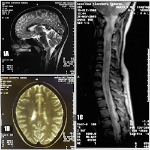Main Article Content
Abstract
Background, The etiology of multiple sclerosis is unclear and infectious agents have been considered. Borrelia infections can cause an intrathecal inflammatory response with accompanying cerebral and spinal imaging findings.
Cases. Two children with acute or subacute initial neurological presentation, subsequent relapsing course, and MR imaging features suggestive of multiple sclerosis are presented. A history of tick bite or dramatic response to antibiotic treatment supported Lyme disease in the beginning, but requirement of disaese-modifying treatment later in the course supported multiple sclerosis.
Results. These cases carrying features supportive of both multiple sclerosis and Lyme disease caused clinical dilemma and were treated for both disorders. Borrelia-specific IgG index testing before any treatment could have prevented the difficulty in differential diagnosis.
Conclusions. Clinical, imaging and CSF findings of multiple sclerosis and acute or chronic progressive borrelia encephalomyelitis may overlap and testing for Borrelia-specific intrathecal antibody synthesis should not be omitted in endemic areas.
Article Details
Copyright (c) 2019 Katarzyna Kotulska-Jóźwiak, Iliyana Pacheva, Katarzyna Kotulska-Jóźwiak, Anna Patrova, Anna Patrova, Elżbieta Jurkiewicz Jurkiewicz, Elżbieta Jurkiewicz Jurkiewicz, Ivan Ivanov, Ivan Ivanov, Dariusz Kuczyński, Dariusz Kuczyński Kuczyński, Ina Geneva, Ina Geneva

This work is licensed under a Creative Commons Attribution-NonCommercial-ShareAlike 4.0 International License.
Authors who publish with this journal agree to the following terms:
Authors retain copyright and grant the journal right of first publication with the work simultaneously licensed under a Creative Commons Attribution License that allows others to share the work with an acknowledgement of the work's authorship and initial publication in this journal.
Authors are able to enter into separate, additional contractual arrangements for the non-exclusive distribution of the journal's published version of the work (e.g., post it to an institutional repository or publish it in a book), with an acknowledgement of its initial publication in this journal.
Authors are permitted and encouraged to post their work online (e.g., in institutional repositories or on their website) prior to and during the submission process, as it can lead to productive exchanges, as well as earlier and greater citation of published work (See The Effect of Open Access).

